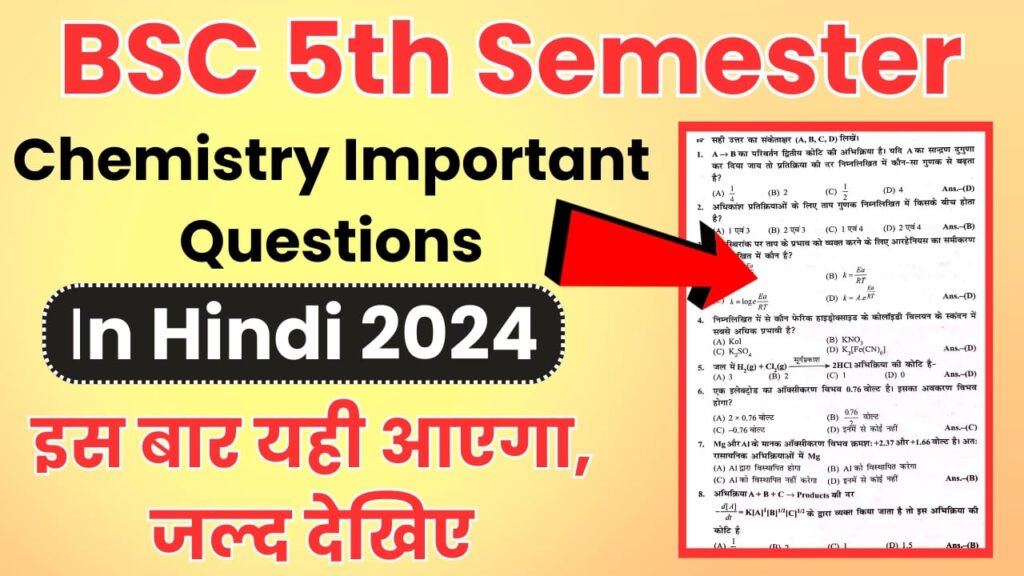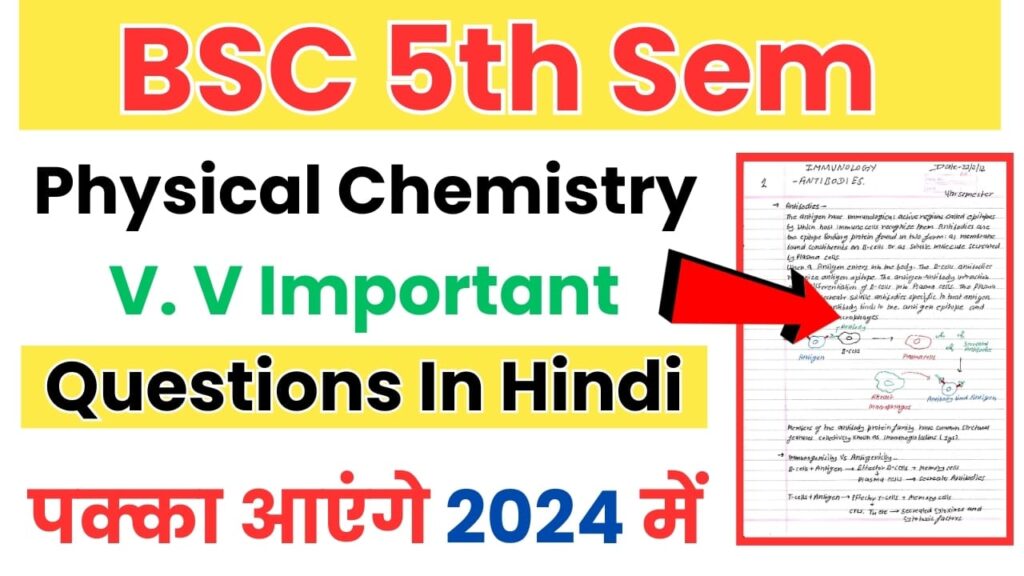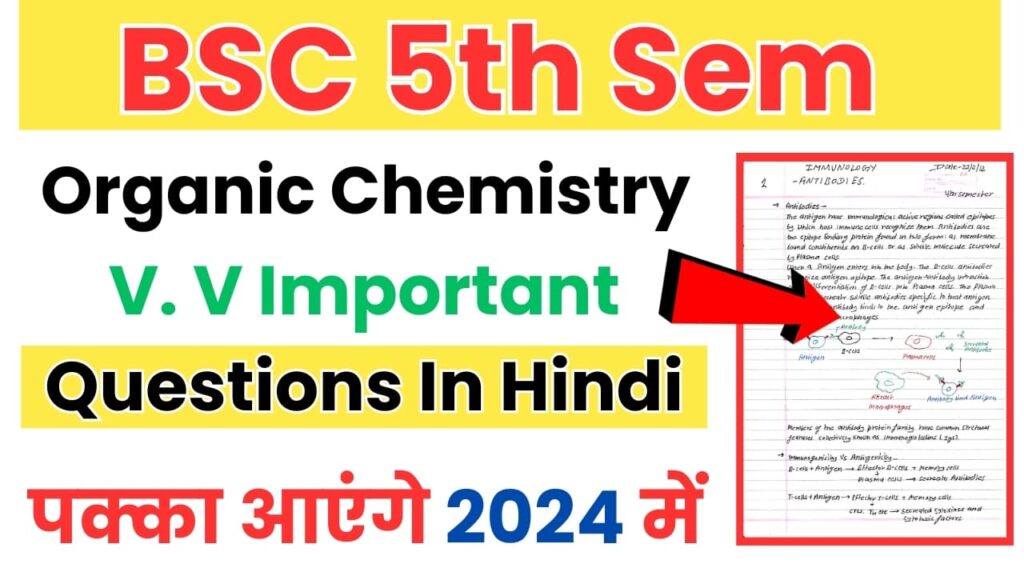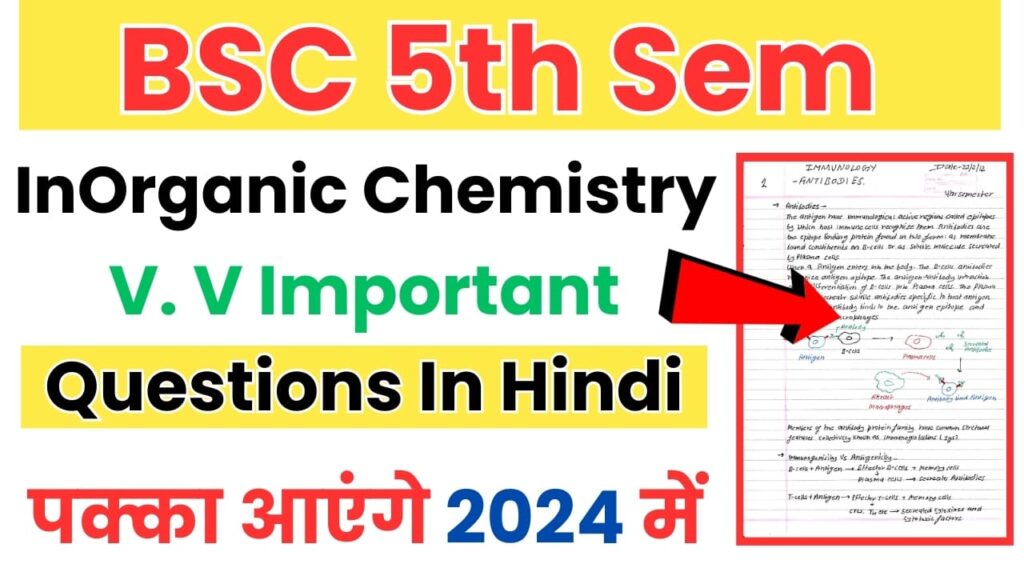नमस्कार साथियों क्या आप जानना चाहते है BSC 5th Semester Chemistry Important Questions in Hindi 2024 के बारे में? दोस्तों आपका स्वागत है इस लेख में, हम आपको BSC 5th Semester Chemistry Important Questions In Hindi के साथ BSC 5th Semester inorganic chemistry important questions, BSC 5th Semester organic chemistry important questions, BSC 5th Semester physical chemistry important questions 2024 के बारे में सब कुछ बताएंगे।

जैसा कि आप जानते हैं Chemistry एक बहुत ही दिमाग लगाने वाला subject है, तो इस लेख में हमने BSC 5th Semester Chemistry Important Questions इकट्ठा किया है जो कि आपको पढ़ने में मदत करेंगे अगर आप इस लेख में बताए हुए Important Questions को एक बार रट लेंगे तो आप समझ लो 60% syllabus cover हो जाएगा, तो BSC 5th Semester Chemistry Important Questions In Hindi की पूरी सूची पढ़ने के लिए इस लेख को अंत तक जरूर पढ़ें ।
यह BSC 5th Semester Chemistry Important Questions के महत्वपूर्ण प्रश्न 2024 प्रतिष्ठित संस्थानों के अनुभवी शिक्षकों द्वारा तैयार किए गए हैं, इन प्रश्नों के पेपर में आने की अधिक संभावना है, इसलिए इन्हें अच्छी तरह से तैयार करें।
Contents
BSC 5th Semester Chemistry Important Questions in Hindi 2024

Q1: परमाणु भौतिकी में डाल्टन का थियोरी क्या है? (What is Dalton’s theory in atomic physics?)
Q2: इलेक्ट्रॉन कनफ़िगरेशन और मूलर बनधन शक्ति क्या है? (What is electron configuration and molar bond strength?)
Q3: गैस कानून की व्याख्या कीजिए। (Explain the gas laws.)
Q4: अम्ल और शारीरिक गुण क्या हैं? (What are acids and their physical properties?)
Q5: वाणिज्यिक उत्पादन के लिए क्यूरी की संरचना क्या है? (What is the structure of curie for commercial production?)
Q6: आधात्मिक उत्पादन के लिए लौह के संरचना क्या है? (What is the structure of iron for spiritual production?)
Q7: परमाणु भौतिकी में नियम-मेन्डलीफ़ का अवशेष क्या है? (What is the residual of the Rule-Mendeleev in atomic physics?)
Q8: जैविक उत्पादन के लिए सोने की संरचना क्या है? (What is the structure of gold for organic production?)
Q9: संवेदनशील द्रव्यों के संयोजक क्या हैं? (What are the conductors of sensitive substances?)
Q10: कार्बनिक उत्पादन के लिए स्टिल की संरचना क्या है? (What is the structure of steel for organic production?)
Q11: तत्वों के संयोजक क्या हैं? (What are the coordinators of the elements?)
Q12: रसायन गठन का उपयोग क्या है? (What is the use of chemical formation?)
Q13: अयस्क के लिए पून्जीवादी संरचना क्या है? (What is the capitalist structure for ore?)
Q14: अम्लों की प्रकृति क्या है? (What is the nature of acids?)
Q15: क्षारों के स्वाभाविक गुण क्या हैं? (What are the natural properties of bases?)
Q16: यौगिक बनावट का प्रभाव क्या है? (What is the effect of chemical composition?)
Q17: द्रव्य के लिए कुचाल तापमान क्या है? (What is the boiling point for the substance?)
Q18: अत्यधिक विस्फोट संरचना क्या है? (What is the structure of excessive explosion?)
Q19: ऊर्जा के निकलने के बिना परमाणु की उत्पत्ति क्या है? (What is the origin of the atom without energy emission?)
Q20: विद्युत चुंबकीय गुण क्या हैं? (What are the electrical magnetic properties?)
Q21: इलेक्ट्रॉन विद्युत गुण क्या हैं? (What are the electron electrical properties?)
Q22: परमाणु भौतिकी में आयस का विज्ञान क्या है? (What is the science of iron in atomic physics?)
Q23: ऊर्जा के अनुपात क्या है? (What is the ratio of energy?)
Q24: सूजन की गुणवत्ता क्या है? (What is the quality of inflation?)
Q25: रसायन और रसायन गणित क्या है? (What is chemistry and chemical mathematics?)
Q26: समावेश अणु क्या है? (What is an inclusion atom?)
Q27: सूक्ष्म रासायनिक गुण क्या हैं? (What are the subtle chemical properties?)
Q28: द्रव्य के गुणों का अध्ययन क्या है? (What is the study of substance properties?)
Q29: वायुमंडलीय दबाव क्या है? (What is atmospheric pressure?)
Q30: परमाणु भौतिकी में विद्युत अधिकार क्या है? (What is electrical power in atomic physics?)
BSC 5th Semester Physical Chemistry Important Questions in Hindi

Q1: सामान्य गैस की स्थितिगतिकी क्या है? (What is the kinetic theory of gases?)
Q2: गैस के घनत्व को कैसे मापा जाता है? (How is the density of a gas measured?)
Q3: गैसों के लिए इडियल गैस कानून क्या है? (What is the ideal gas law for gases?)
Q4: गैसों के लिए गैस की अपेक्षित स्थितिगतिकी क्या है? (What is the expected kinetic theory of gases?)
Q5: गैसों के लिए मौलिक समीकरण क्या होता है? (What is the equation of state for gases?)
Q6: वन-द्वियत्रीय गैस क्या होता है? (What is a monoatomic gas?)
Q7: गैसों के लिए वायराल इकाई क्या है? (What is the viral unit for gases?)
Q8: गैसों के लिए मौलिक शीतलन और घर्मविकिरण क्या है? (What is the specific heat and heat radiation for gases?)
Q9: गैसों के लिए विस्तार और ऊष्मा क्षमता क्या है? (What is the expansion and thermal capacity for gases?)
Q10: गैसों की स्थितिगतिकी में प्रोटॉन के प्रकार क्या होते हैं? (What are the types of protons in the kinetic theory of gases?)
Q11: विरोधी गैस क्या है? (What is the antagonistic gas?)
Q12: गैस की सामान्य प्रक्रिया क्या है? (What is the general process of gas?)
Q13: गैस का अवसादन क्या होता है? (What is the decay of gas?)
Q14: गैस की धारा क्या होती है? (What is the flow of gas?)
Q15: गैस की विस्तारित क्षमता क्या होती है? (What is the extended capacity of gas?)
Q16: गैस का समर्पण क्या होता है? (What is the commitment of gas?)
Q17: गैस की समय धारा क्या होती है? (What is the time flow of gas?)
Q18: गैस की अतिसंवेदनशीलता क्या है? (What is the hyper-sensitivity of gas?)
Q19: गैस की विस्तारित समीकरण क्या है? (What is the extended equation of gas?)
Q20: गैस की सदी क्षमता क्या है? (What is the century capacity of gas?)
Q21: गैस का अभिमुखीयन क्या है? (What is the adsorption of gas?)
Q22: गैस की ध्वनि क्या है? (What is the sound of gas?)
Q23: गैस की समाप्ति क्या है? (What is the termination of gas?)
Q24: गैस की अणुरेखिकता क्या है? (What is the atomicity of gas?)
Q25: गैस की स्थायिता क्या है? (What is the stability of gas?)
Q26: गैस का समर्थन क्या है? (What is the support of gas?)
Q27: गैस का संवहन क्या है? (What is the condensation of gas?)
Q28: गैस की स्थितिगतीकरण क्या है? (What is the state of gasification?)
Q29: गैस की समुदायिकता क्या है? (What is the community of gas?)
Q30: गैस की स्थितिशीलता क्या है? (What is the stability of gas?)
BSC 5th Semester Organic Chemistry Important Questions in Hindi

Q1: आल्कोहलों और इथरों के बीच अल्कोहलों के उत्पन्नन में विभिन्न पथों का वर्णन कीजिए। (Describe various pathways in the formation of alcohols from alcohols and ethers.)
Q2: विभिन्न संयोजकों के साथ अल्कोहलों की स्थापना के विभिन्न विधियों का वर्णन कीजिए। (Describe various methods of the formation of alcohols with different reagents.)
Q3: अल्कोहलों के अद्वितीय विशेषताएँ और उनके विभिन्न उपयोग। (Unique properties of alcohols and their various uses.)
Q4: कार्बनिक यौगिकों के बीच अपेक्षित प्रतिक्रियाएँ। (Expected reactions among organic compounds.)
Q5: सुल्फोनेट्स के उत्पन्नन के प्रमुख मार्ग। (Major pathways of sulfonate formation.)
Q6: ऐपोक्साइड के रसायन गुण। (Chemical properties of epoxides.)
Q7: एस्टर्स के निर्माण और उनके उपयोग। (Formation and uses of esters.)
Q8: विभिन्न कार्बनिक यौगिकों के बीच नुक्त-संयोजन। (Point-to-point linkage among various organic compounds.)
Q9: इसिक्विलायजेशन प्रक्रिया का वर्णन। (Description of the isomerization process.)
Q10: एथरों के निर्माण में उपयोगिता। (Utility in the formation of ethers.)
Q11: आल्कोहल और फेनोलों के निर्माण के लिए स्थापित प्रक्रियाएं। (Established processes for the formation of alcohols and phenols.)
Q12: निकेल के उपयोग से रसायनिक रिएक्शन्स का विवेचन। (Study of chemical reactions with the use of nickel.)
Q13: कार्बनिक यौगिकों के बीच निर्मित विभिन्न संयोजन। (Various formations among organic compounds.)
Q14: एस्टर और लैक्टोन्स के बीच संयोजन। (Reactions between esters and lactones.) Q15: कार्बनिक यौगिकों के बीच क्रोस-संयोजन। (Cross-reactions among organic compounds.)
Q16: इथरों के निर्माण और इसके उपयोग। (Formation and uses of ethers.)
Q17: नुक्लीफाइल विद्रुत्ति के माध्यम से अल्कोहल और ऐपोक्साइड्स के बीच की रिएक्शन्स। (Reactions between alcohols and epoxides through nucleophilic substitution.)
Q18: अमाइड्स के निर्माण और उपयोग। (Formation and uses of amides.)
Q19: कार्बनिक यौगिकों के बीच निर्मित उत्तेजन। (Productions formed among organic compounds.)
Q20: सिलाइनेस, बोरेनेस और इथाइनेस के विभिन्न संयोजन। (Various reactions of silanes, boranes, and ethynes.)
Q21: कार्बनिक यौगिकों के बीच उत्पन्न अद्वितीय रासायनिक प्रक्रियाएँ। (Unique chemical processes formed among organic compounds.)
Q22: अल्कोहलों के रिएक्शन और इसके परिणाम। (Reactions of alcohols and their consequences.)
Q23: कार्बनिक यौगिकों के बीच रासायनिक अपेक्षित प्रतिक्रियाएँ। (Expected chemical reactions among organic compounds.)
Q24: संयोजकों के साथ अल्कोहल और फेनोलों के बीच रासायनिक रिएक्शन्स। (Chemical reactions between alcohols and phenols with reagents.)
Q25: अल्कोहल और ऐपोक्साइड्स के बीच रिएक्शन की विशेषताएं। (Characteristics of reactions between alcohols and epoxides.)
Q26: निकेल के संयोजकों के साथ कार्बनिक यौगिकों के रिएक्शन्स। (Reactions of organic compounds with nickel reagents.)
Q27: सुल्फोनेट्स के उत्पन्नन के प्रमुख रासायनिक मार्ग। (Major chemical pathways of sulfonate formation.)
Q28: ऐपोक्साइड्स के रिएक्शन और इसके अपेक्षित परिणाम। (Reactions of epoxides and their expected outcomes.)
Q29: अल्कोहलों के निर्माण में उपयोगिता। (Utility in the formation of alcohols.)
Q30: कार्बनिक यौगिकों के बीच क्रोस-संयोजन के उत्पन्नन के प्रमुख मार्ग। (Major pathways of cross-reaction among organic compounds.)
BSC 5th Semester Inorganic Chemistry Important Questions in Hindi

Q1: धातुओं के आधारित समीकरण क्या होते हैं? (What are metal-based equations?)
Q2: आधातुओं की आवश्यकता क्या है? (What is the necessity of non-metals?)
Q3: आधातुओं के प्रमुख गुण क्या हैं? (What are the main properties of non-metals?)
Q4: आधातुओं के प्रकार क्या हैं? (What are the types of non-metals?)
Q5: प्राथमिक, अवाणीज्य, धातुओं के गुण क्या हैं? (What are the properties of primary, secondary, and tertiary metals?)
Q6: किरणिकीय धातुओं की खोज किसने की? (Who discovered transition metals?)
Q7: किरणिकीय धातुओं के गुण क्या हैं? (What are the properties of transition metals?)
Q8: आधातुओं के प्रकार क्या हैं? (What are the types of non-metals?)
Q9: अधातुओं के गुण क्या हैं? (What are the properties of semi-metals?)
Q10: किरणिकीय धातुओं के लाभ क्या हैं? (What are the benefits of transition metals?)
Q11: अधातुओं के उद्दीपक क्या हैं? (What are the igniters of semi-metals?)
Q12: किरणिकीय धातुओं के लाभ क्या हैं? (What are the benefits of transition metals?)
Q13: आधातुओं के उपयोग क्या हैं? (What are the uses of non-metals?)
Q14: प्राथमिक, अवाणीज्य, धातुओं के उपयोग क्या हैं? (What are the uses of primary, secondary, and tertiary metals?)
Q15: किरणिकीय धातुओं के उपयोग क्या हैं? (What are the uses of transition metals?)
Q16: आधातुओं की उत्पत्ति कहाँ होती है? (Where are non-metals found?)
Q17: अधातुओं की उत्पत्ति कहाँ होती है? (Where are semi-metals found?)
Q18: किरणिकीय धातुओं की उत्पत्ति कहाँ होती है? (Where are transition metals found?)
Q19: आधातुओं के उत्पत्ति कहाँ होती है? (Where are non-metals found?)
Q20: प्राथमिक, अवाणीज्य, धातुओं की उत्पत्ति कहाँ होती है? (Where are primary, secondary, and tertiary metals found?)
Q21: किरणिकीय धातुओं की उत्पत्ति कहाँ होती है? (Where are transition metals found?)
Q22: आधातुओं के उत्पत्ति कहाँ होती है? (Where are non-metals found?)
Q23: अधातुओं के उत्पत्ति कहाँ होती है? (Where are semi-metals found?)
Q24: किरणिकीय धातुओं की उत्पत्ति कहाँ होती है? (Where are transition metals found?)
Q25: आधातुओं के उत्पत्ति कहाँ होती है? (Where are non-metals found?)
Q26: प्राथमिक, अवाणीज्य, धातुओं की उत्पत्ति कहाँ होती है? (Where are primary, secondary, and tertiary metals found?)
Q27: किरणिकीय धातुओं की उत्पत्ति कहाँ होती है? (Where are transition metals found?)
Q28: आधातुओं के उत्पत्ति कहाँ होती है? (Where are non-metals found?)
Q29: अधातुओं के उत्पत्ति कहाँ होती है? (Where are semi-metals found?)
Q30: किरणिकीय धातुओं की उत्पत्ति कहाँ होती है? (Where are transition metals found?)
Also Read: BSC 2nd Semester Chemistry Important Questions in Hindi 2024! रटलो 90% यही आएंगे
BSC 4th Semester Chemistry Important Questions in Hindi 2024!
BSC 3rd Semester Chemistry Important Questions in Hindi 2024! रटलो 60% यही आएंगे
हमें उम्मीद है कि इस लेख की मदद से आपको BSC 5th Semester Chemistry Important Questions in Hindi 2024 के बारे में जानकारी मिल गई होगी।
दोस्तों आपको यह पोस्ट कैसी लगी कृपया हमें कमेंट सेक्शन में बताएं और यदि आपके कोई प्रश्न हों तो बेझिझक हमसे Comment Box में पूछ सकते हैं। यदि आपको यह पोस्ट उपयोगी लगी तो कृपया इसे दूसरों के साथ साझा करें।